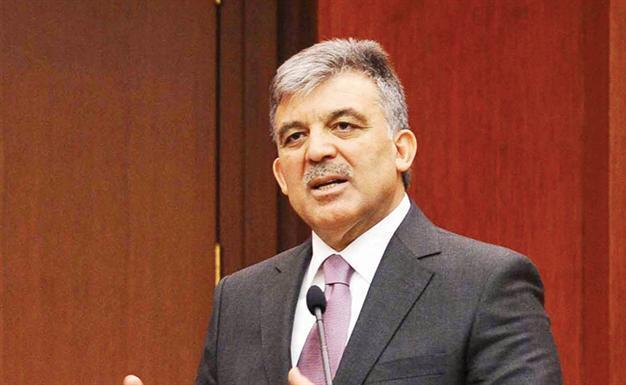Coup suspects grilled about military group
ANKARA - Hürriyet Daily News

President Gül calls post-modern coup
unlawful acts of extraordinary period. AA photo
President Abdullah Gül lent his support to the investigation into the so-called “post-modern
coup” of 1997 as police questioned 26 suspects, among them former Deputy Army Chief Çevik Bir, on charges of attempting a military coup.
“We all know that this was an interim period. It is still fresh in our memories. It’s natural to look into the unlawful acts of that extraordinary period and initiate proceedings,” said Gül, who was a minister in the ousted government.
The Hürriyet Daily News has learned that the questions posed to the suspects yesterday pertained mostly to the activities of the “West Working Group,” a committee of military officials that is said to have monitored the government and kept illegal records of private information about hundreds of thousands of people. The suspects were shown a chart of the Group and asked whether they were familiar with it, what the criteria to serve in the Group were, what the duties of the Group’s members were, how they carried out their jobs, how the chain of command functioned within the Group, and how the records were used.
Rounded up in several provinces, all suspects were taken to the Ankara Police Headquarters for questioning April 12. They are expected to be handed over to the judicial authorities over the weekend, and it will then be decided whether to release or jail them pending trial. Public prosecutors Mustafa Bilgili and Kemal Çetin will be in charge of taking their testimonies. Çetin is the prosecutor who drew up the recent indictment over the 1980 coup.
Five people still remain on the police’s search list as part of the investigation. Three of them are said to be abroad, while police have so far failed to locate the other two.
Prime Minister Tayyip Recep Erdoğan, who was also a member of the ousted Welfare Party (RP) at the time, rejected accusations that revenge was a motive behind the probe. “I hope that the process will be completed in a short time and that justice will prevail,” he said late April 12.
The “post-modern coup” or the “Feb. 28 process” refers to a harsh army-led campaign that forced
Turkey’s first Islamist Prime Minister Necmettin Erbakan to resign in June 1997, after only a year in office. The process took its name from the Feb. 28, 1997 meeting of the National Security Council, at which Turkey’s then-omnipotent military imposed a series of tough secularist decisions on Erbakan. These aimed mainly at curbing Islamic education, in the face of what was perceived to be a growing threat to Turkey’s secular system.
[HH] War of words
The probe fanned political squabbles, with the ruling Justice and Development Party (AKP) facing fresh accusations of revanchism. Deputy Prime Minister Bekir Bozdağ said the main opposition Republican People’s Party (CHP) was in “great panic,” adding sardonically that it had nothing to worry about as the investigation was not targeting “those who applauded” the army’s intervention.
In a written statement, CHP deputy chair Erdoğan Toprak retorted that his party was against all forms of military tutelage, but charged that the AKP government was no different from martial rule and acted “with the same feeling of revenge and score-settling.” The timing of the probe has been arranged to divert attention from the failure of the government’s policy on Syria and the Deniz Feneri, or “Lighthouse,” case, he added.
Deputy Parliament Speaker Meral Akşener, interior minister in the unseated coalition government, charged that the military had “collaborators” within the state and bureaucracy at the time. “I wonder what positions those people hold today. For example, Alaaddin Yüksel, who was director general of police and fomented one of the most serious crises at the time, is today governor of Ankara. I want to draw attention to such people,” she said.
